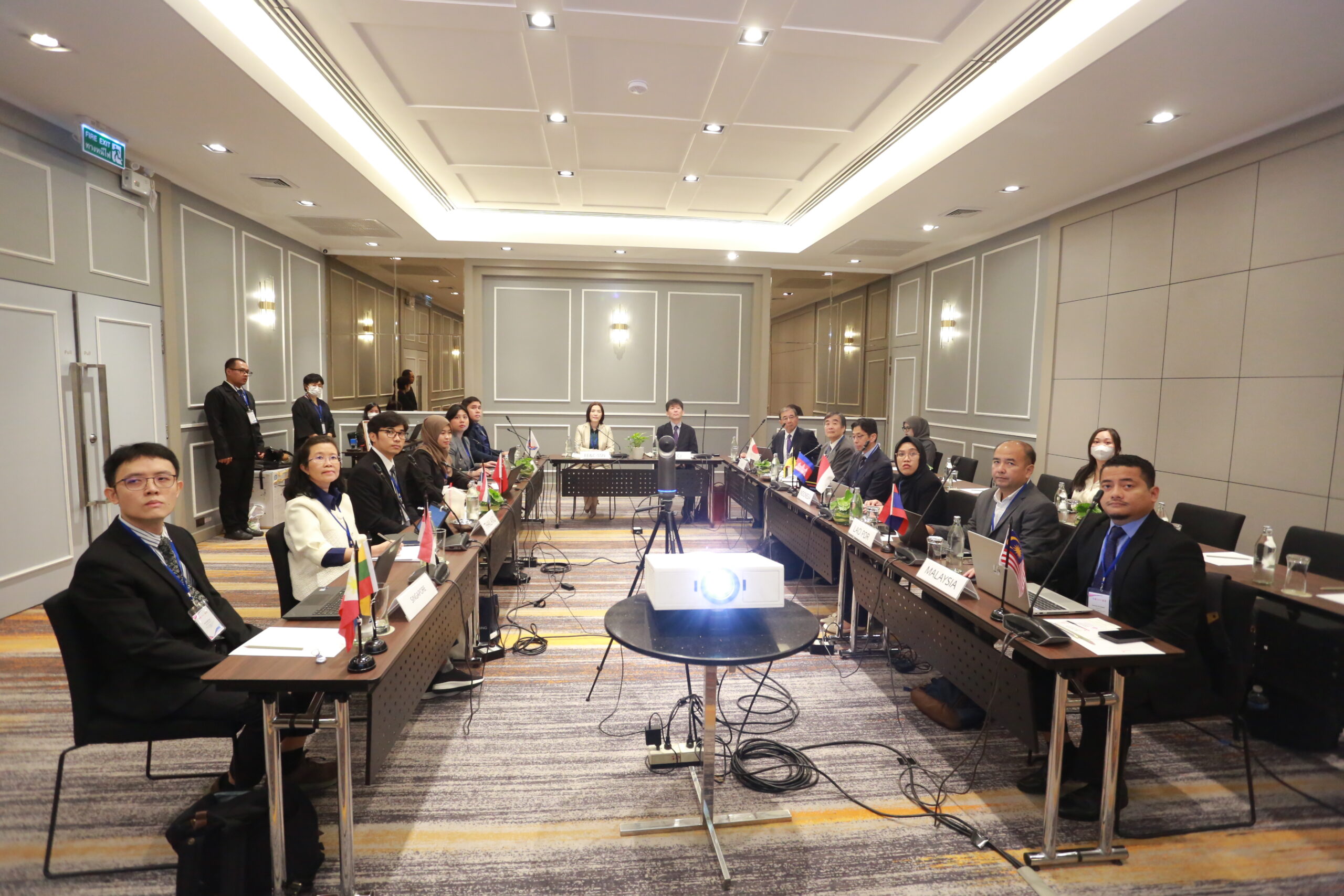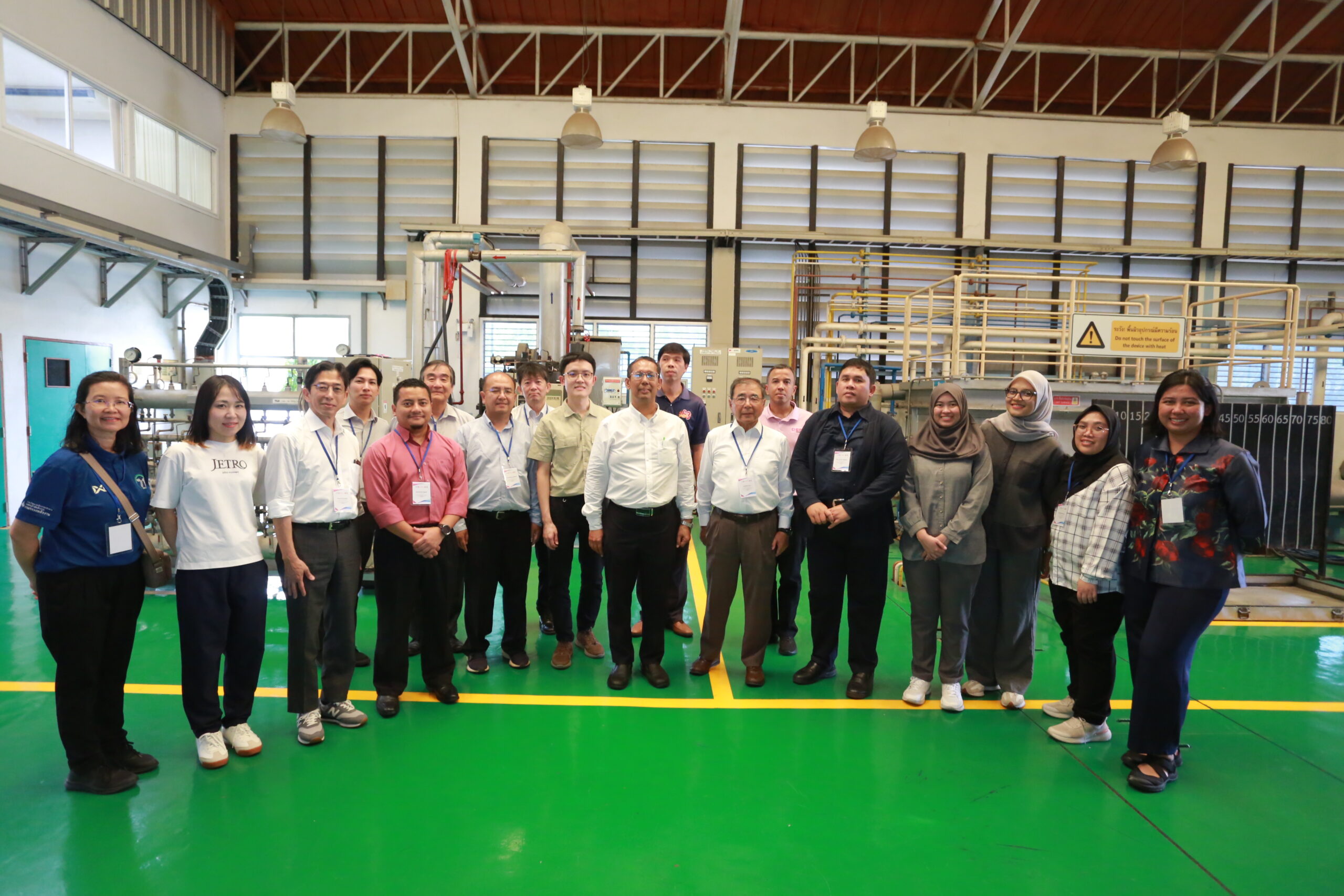Menu


Photo 1. AJEEP Induction Meeting Group Photo
The ASEAN Centre for Energy (ACE), in collaboration with the Energy Conservation Center Japan (ECCJ), co-organised the ASEAN-Japan Energy Efficiency Partnership (AJEEP) Inception Meeting under the SOME-METI Work Programme 2025-2026. This hybrid Meeting was held on 13-14 August 2025 at the Amari Don Muang, Bangkok, Thailand and attended by representatives from nine ASEAN Member States (AMS), ACE, and ECCJ. The meeting aims to discuss AJEEP activities for the fiscal year 2025-2026, specifically Scheme 4 focusing on the development of the Sustainable ASEAN Energy Management Certification Scheme (SAEMAS), and Scheme 5 focusing on Carbon Neutrality (CN) promotion.

Photo 2. Opening remarks by Dr. Apiradee Thammanomai, DEDE, Thailand and Masayasu Koizumi, ECCJ (left) and Naing Naing Linn, ACE (right)
The opening session featured welcoming remarks from the host country, delivered by Dr. Apiradee Thammanomai, Director of Strategy and Planning Division, Department of Alternative Energy Development and Efficiency (DEDE), Thailand, where she highlights the plan to to raise awareness and disseminate the best practices for EEC and CN. Subsequently, Masayasu Koizumi, Managing Director of Energy Efficiency Centre Japan (ECCJ), also highlighted the commitment ECCJ has to support ASEAN, and to narrow the gap for EE&C for AMS. Naing Naing Linn, Manager of Energy Efficiency and Conservation Department, ASEAN Centre for Energy (ACE) delivered remarks regarding the importance of the AJEEP initiative in supporting ASEAN’s shared objective to reduce energy intensity by 32% by 2025, from 2005 levels, as set out in the ASEAN Plan of Action for Energy Cooperation (APAEC) Phase II: 2021–2025.
The Meeting commenced with a setting the scene presentation from Mardika Firlina, Technical Officer, Energy Efficiency and Conservation Department, ACE with an overview of the AJEEP activities for the fiscal year of 2025 with APAEC Framework and Regional Initiative for EE&C and Takashi Yamanaka, General Manager, International Planning Department, ECCJ, which provided basic direction and key points for AJEEP 2025-2026 and the way forward. Scheme 4 will concentrate on completing SAEMAS modules and piloting trials, and Scheme 5 will broaden CN diagnosis and ZEB promotion throughout the industrial, construction, and transportation sectors.

Photo 3. Dr. Apiradee Thammanomai, DEDE leading the session
Led by Dr. Apiradee Thammanomai, the next session is then followed up with country reports from ASEAN Member States on updates on EE&C regulatory framework for Energy Management System and Energy Manager Certification, the current state of Energy Management Certification Systems from each member states and updates on CN diagnosis candidate selection in the building and industrial fields. It is also followed up with a Q&A and opinion exchange session regarding comments and inputs on CSM and AM modules.

Photo 4. Presentations from Mardika Firlina, ACE (left) and Syahira Narizta Syahputri, ACE (right)
The afternoon session continued with a review of AJEEP Scheme 4 activity progress, led by Dr. Yoshitaka Ushio, Senior Advisor of International Cooperation Division, ECCJ. Personnels from ECCJ provided review of Scheme 4 Activities in 2024 and the proposed implementation plan for 2025, as well as outline of SAEMAS CSM & AM trial run. Syahira Narizta Syahputri, Business Developer Unit Officer, Corporate Affairs Department, ACE, detailed the SAEMAS preliminary assessment for implementation in AMS, specifying that the integration of SAEMAS into a national level is expected to start from 2026. Rio Jon Piter Silitonga, Senior Officer, Energy Efficiency and Conservation Department, ACE, also detailed a proposed stepwise approach for ASEAN Mutual Recognition Agreement (MRA) for energy professionals and strategy to support SAEMAS implementation. The day ended with an open discussion on plans to conduct SAEMAS CSM trial, including the expected participants, timeline and expected output as part of APAEC milestones.

Photo 5. Rio Jon Piter Silitonga, ACE (left) and Dr. Yoshitaka Ushio, ECCJ (right) serving as a moderator
On the second day, Rio Jon Piter Silitonga led the meeting to discuss the progress of AJEEP Scheme 5 activities. The session featured presentations from ECCJ and ACE on the Progress of Scheme 5 activities and further understanding of CN Promotion in ASEAN, which includes review of Scheme 5 activities in 2024 and the proposed implementation plan for 2025. The meeting also discussed cooperative activities of Zero Energy Building (ZEB) Dissemination in ASEAN Member States by JASE-W, and JETRO Bangkok highlighting their activities in promoting carbon neutrality in the industrial sector.
The meeting concluded with a summary of key activities for AJEEP fiscal year 2025-2026. As AJEEP Schemes 4 and 5 approach their final year of implementation in 2026, after beginning in 2022, the Meeting also discussed initial plans for AJEEP Schemes 6 and 7, which will continue SAEMAS promotion and expand CN diagnosis and ZEB dissemination in ASEAN. With the ending of the meeting, it is expected that AMS will be able to cooperate to achieve the main objectives of AJEEP Scheme 4 and 5 by 2026.

Photo 6. Mini plant lecture session, led by Dr. Narong Pooyoo, DEDE, Thailand
After the closing session, DEDE Thailand coordinated a site visit to the Practical Energy Management Training Center (Mini Plant), which is a part of a training program for energy conservation. It started construction in 2002 and was completed in 2005 and was built by the cooperation between the Japan Government and the Thailand Government through the Japan International Cooperation Agency (JICA) and the DEDE for developing training courses in energy management and renewable energy.

Photo 7. Mini plant units showcase
As part of the training, a lecture session was delivered by Dr. Narong Pooyoo, Senior Professional Mechanical Engineer, Division of Energy Human Resource Development (DEHRD). He also explained the facilities available in the mini plant. The mini plant is divided into three buildings, with each building specialising in different machineries and equipment. The Energy Conservation Training Building specialises in electrical and thermal units, such as pumps, compressors, furnaces and boilers. Demonstration Building 1 and 2 has units focused on renewable energy, such as ethanol production process, biomass gasifier and solar rooftop units.

Photo 8. Mini plant visit group photo
The ASEAN Japan Energy Efficiency Partnership (AJEEP) is a programme under the ASEAN Senior Officials Meeting on Energy and Ministry of Economy, Trade and Industry of Japan (SOME-METI) work programme. The ASEAN-Japan EE&C Cooperation was commenced in 2000, with the implementation of Project for Promotion of Energy Efficiency and Conservation (PROMEEC) and Multi-Country Training Programme on Energy Conservation for ASEAN Countries (MTPEC). In 2012, the cooperation continues with the launch of the AJEEP, which is implemented by ACE and the Energy Conservation Center of Japan (ECCJ), in coordination with the ASEAN EE&C-SSN.
(Photos by DEDE Thailand)
